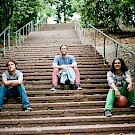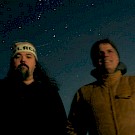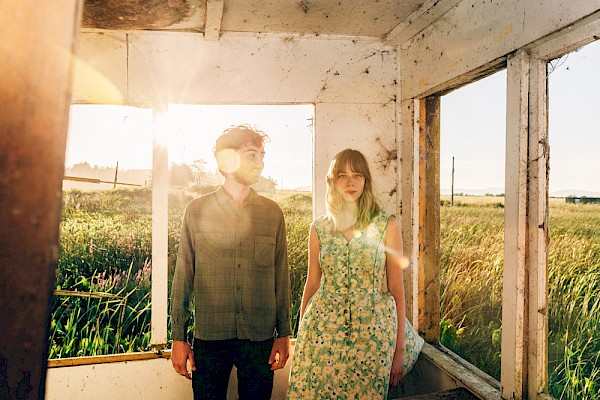 Photos by Brendon BurtonVivian Leva and Riley Calcagno were managing life, education, love and music from a distance before it became a necessity for all of us. Pre-pandemic, they were both in college at different schools. Normally, they’d be doing music full-time together, but Calcagno was in Ohio, Leva was on the West Coast, and she just graduated this past December.
Photos by Brendon BurtonVivian Leva and Riley Calcagno were managing life, education, love and music from a distance before it became a necessity for all of us. Pre-pandemic, they were both in college at different schools. Normally, they’d be doing music full-time together, but Calcagno was in Ohio, Leva was on the West Coast, and she just graduated this past December.
“We’ve been playing music together for about five years, and during that whole time, we were living across the country from one another so a lot of our music making had to be done separately,” says Leva. They sent each other songs as voice memos or worked on them during weekend visits until it came time to lay the album down. “We would come together when we could, so I think that kind of distance and separation was ingrained in a lot of the music.”
While they wrote and recorded all the music pre-pandemic, echoes of isolation from the ones we love and the threat of loss resonate throughout the tracks. The themes of space and distance are well-explored on Vivian and Riley’s eponymous record due out March 12.
“We recorded it all in one session, Leva recalls. “I can't remember exactly how many days about five or six, we did it in Eunice, Louisiana, not in Portland. I'm from Virginia, and last January we were there visiting my parents. Then we drove from Virginia to Louisiana and spent a couple weeks down there recording with a great producer and engineer, Joel Savoy. We got to work with musicians that just came and went and were really lucky that we scheduled that before the pandemic hit.” In addition to Leva on rhythm and Calcagno on lead guitar, those musicians are Trey Boudreaux (bass), Matty Meyer (drums), Chris Stafford (pedal steel) and Sam Fribush (piano).
“Hollowed Hearts” is a track that perfectly encapsulates the push and pull of a long-distance relationship through major and minor transitions. Set to the gentle strum of a golden-tinged waltz, Leva and Calcagno’s lilting harmonies conjure a lighter slice of Gillian Welch and Dave Rawlings. The elevated chorus pierces the soft reflection of the verses to a plea and a cry with “take my hand, pull me in, say you’ll love me again.”
As with all good poetry in music, songs can be bent and reinterpreted to personal significance. Even the opening verse eerily doubles as a musing on fear of loss and living in the time of Covid. “Throw it all away it’s not that easy. Find some air to breathe, it don’t come easy. I see a lifetime of loving you, but I can’t hold this inside.”
As far as the inside story, Leva and Calcagno are a couple, but it’s not the headline or at the forefront of their music. “We are together but our music is not always about us,” Leva explains. “I wrote ‘Hollowed Hearts’ when I was in my freshman year of college in South Carolina in my dorm room. I think it's kind of an encouragement to fight through, even when something is filled with so much pain. It's better to fight than to give up—finding moments of feeling things together and dealing with hurting someone that you love and trying to get to the other side of that. It certainly wasn't a conscious decision to write it as a waltz, it just happened! I do think waltzes can be hypnotic and highlight the conflicting yet compelling feelings between two people.” Visually, the video is a still image of the couple in an abandoned house, drawing ever closer to the empty window between them, the drifting, shapeless clouds hang over an open field, the only movement in the frame.
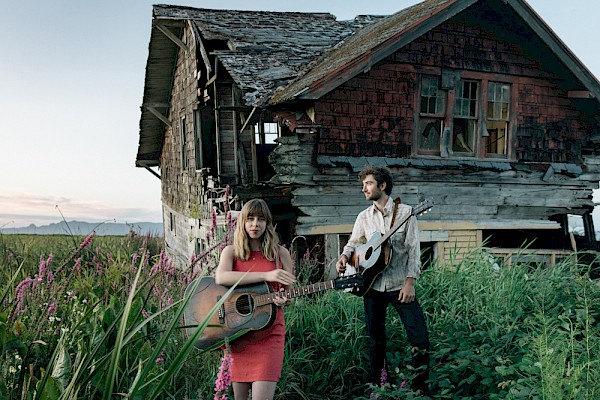 Leva says that it’s hard to pick favorites, but she confesses that “Hollowed Hearts” is perhaps one of the favorite songs that she’s written. “Sometimes you write music when you're in the middle of experiencing something, sometimes you do it in lots of different stages after experiencing something. But it was written while I was in the emotions and I wrote it all at once. It was not forced at all and I really appreciate that about it. Even when we recorded it, it came very naturally to arrange it.”
Leva says that it’s hard to pick favorites, but she confesses that “Hollowed Hearts” is perhaps one of the favorite songs that she’s written. “Sometimes you write music when you're in the middle of experiencing something, sometimes you do it in lots of different stages after experiencing something. But it was written while I was in the emotions and I wrote it all at once. It was not forced at all and I really appreciate that about it. Even when we recorded it, it came very naturally to arrange it.”
As a duo and couple, there was a natural, musical bridge to each other well before they met—a backstory as timeless and charming as the music they write together.
“We were kind of connected even though we didn't know each other because my parents are musicians and they were in a great duo together called Jones and Leva. They were also in the old-time music community and Riley grew up listening to their music, so he knew who my parents were.”
Calcagno describes the small, traditional music community he grew up in and how with his two friends, Sami Braman and Leo Shannon, they formed the stringband, The Onlies, when they were seven. “We were just kid fiddlers playing whatever we were interested in,” he says.
Leva and Calcagno shared a lot of common musical and parallel experiences. But well before that, when Leva was a year old, her parents were on tour on the west coast. They asked around for someone to look after her while they were playing a show, when the offer came, “I know someone with another one year-old.” That other child was Leo Shannon, who ended up being Calcagno’s best friend growing up and Leva’s future bandmate.
“We had that original musical connection and then we met at a festival, so it was kind of easy to get to know each other and just play music together,” Leva says.
Similarly, The Onlies were heavily influenced by the Portland-based old-time band Foghorn Stringband, a mainstay in the Northwest Old-time music fiddle scene whose lead member Caleb Klauder produced their most recent old-time record. After Leva joined The Onlies in 2017, she and Calcagno began writing their own music.
Continuing their precocious success, Leva was not quite 20 when her critically acclaimed 2018 debut, Time Is Everything was released with Calcagno collaborating on songwriting, co-producing, singing, and playing multiple instruments. Rolling Stone Country hailed the album as shining “a light on the past without giving up its place in the present."
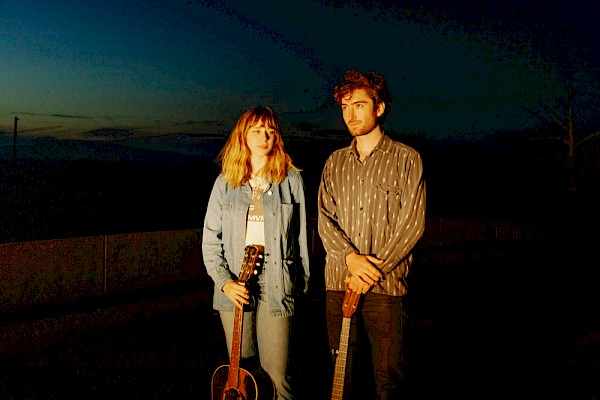 Calgano describes how he found old time music through his father who discovered it in Seattle in the '80s and '90s on cassettes, in jam sessions, and attending fiddler’s conventions on the west coast. “He found the music and I started playing as a kid,” Calcagno says, “a lot of those recordings were just kind of passed person to person or cassette to cassette or iTunes library to iTunes Library. Then there’s the cross-generational friendships, but I think that's the reason why it's difficult to ask, ‘who are some of the people who are doing this now?’ A lot of people that I think of, maybe their last record was in 1993, but the records feel like they’re living with us now. It outlasts that six-month release bubble that happens a lot with music that’s currently recorded.”
Calgano describes how he found old time music through his father who discovered it in Seattle in the '80s and '90s on cassettes, in jam sessions, and attending fiddler’s conventions on the west coast. “He found the music and I started playing as a kid,” Calcagno says, “a lot of those recordings were just kind of passed person to person or cassette to cassette or iTunes library to iTunes Library. Then there’s the cross-generational friendships, but I think that's the reason why it's difficult to ask, ‘who are some of the people who are doing this now?’ A lot of people that I think of, maybe their last record was in 1993, but the records feel like they’re living with us now. It outlasts that six-month release bubble that happens a lot with music that’s currently recorded.”
As American roots music traditions go, songs like these are a shared vernacular of the human experience of identity, love and loss. Not only as a historical continuation of style, and instrumentation, but as storytelling and shared learning. Calcagno talks about how music festivals like Stickerville in Weiser, Idaho are at the heart of the contemporary community, where music is learned by ear, traded and played together with fiddle contests, picking parties, and outdoor jams around campsites. Imagine a nightly roving party of private Pickathon side stages to choose from after the main acts leave the stage.
Although the bulk of the album tracks focus on love and loss, Leva points to an emotional outlier, “Red Hen.” “I think it’s really odd and different from a lot of the other tracks,” she says. “I really love how it ended up being kind of theatrical with a really creative process for arranging it. I often write straight-up country songs, but I wrote this interesting riff, getting to play with it and having everyone's ideas layered on top of it.” Leva laughs and adds, “It’s one of the only songs that’s not about a relationship, which is kind of refreshing, while still fitting with the album's themes.”
Calcagno agrees. “A lot of the songs on the record are about distance. On ‘Red Hen,’ it manifests in different ways. I think it highlights the distances in understanding, like how we interpret politics or history or current events. The distance that creates between people. But that’s just me talking about Viv’s song that I did not write,” he says, adding a laugh, “but we talk about love and relationships and friendships a lot in the record, which I think is really relevant this past year.”
The duo lament the strangeness in releasing a record right now because like most things, the affirmation arrives digitally and it’s not nearly as adventurous as they’d like. “We live in a weird time of algorithms and mysteries about who gets to see your music that’s often dictated by this technological middle man,” Calcagno notes.
“Careerwise, of course I’d love to be playing these shows out and have an audience,” says Leva. “A lot of these songs deal with some heavy things that I think a lot of people are working through.”
“I kind of hope that these songs find people in the moments that they need them,” Calcagno adds.
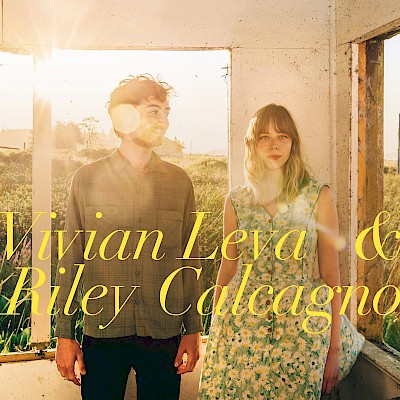 If there’s one beautiful takeaway from listening to contemporary American roots old time music done well, it’s in recognizing the longevity and the powerful place it has occupied in both our collective history and community. With ties to Appalachian music and traditional mountain fiddle tunes, there is a long-standing sonic and oral tradition.
If there’s one beautiful takeaway from listening to contemporary American roots old time music done well, it’s in recognizing the longevity and the powerful place it has occupied in both our collective history and community. With ties to Appalachian music and traditional mountain fiddle tunes, there is a long-standing sonic and oral tradition.
From the current pandemic and politics to the history of people having to separate because of pandemics or politics, listening to old time music is like folk medicine, a balm for the soul from the heartland. Vivian Leva and Riley Calcagno deliver a beautiful collection of songs that wrestles with the distances in our lives from the people we love and brings us closer to understanding the people we don’t.
“I think one lesson from our traditional music community is that the records that mean something to me, whether they find me or I find them, like I did with Viv’s parent’s records, they’re not always recent,” Calcagno says. “I think it’s important to remember that records last. They don’t necessarily last in the press or in people’s Spotify playlists, but they last in people’s minds where maybe they’ll resurface. Hopefully, they’ll come back around at some point and inspire someone.”


